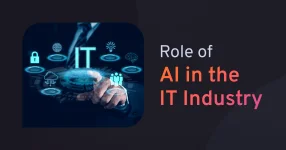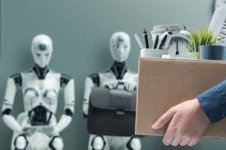The integration of Artificial Intelligence (AI) in IT companies is no longer a futuristic concept — it's already happening. From automating customer service to optimizing backend operations, AI is influencing how IT firms operate, hire, and innovate.
But the pressing question remains: Is AI a threat to the human workforce, or is it just another tool for growth?
Top IT giants like TCS, Infosys, Wipro, and Accenture have already embedded AI into their operations:
These implementations increase productivity, reduce human error, and lower costs — but they also spark concerns about job displacement.
There’s no doubt that AI will replace certain repetitive jobs. Tasks like manual data entry, basic coding, or routine testing may soon be fully automated. However, it will also create demand for new roles:
IT employees who reskill and adapt will remain highly valuable.
While AI is impressive, it still can’t:
IT companies still need project managers, creative developers, and client-facing consultants — roles that require soft skills, leadership, and experience.
According to a report by NASSCOM, over 40% of India’s IT workforce will need reskilling in the next 3–5 years to stay relevant. Companies are already investing in internal training programs, partnerships with edtech platforms, and AI bootcamps.
AI will reshape the IT industry, but whether it becomes a tool for empowerment or a force of disruption depends on how companies and individuals respond. Should governments and IT companies work together to regulate AI use in hiring and layoffs? Should there be policies for transparency when AI replaces a job?
Do you believe AI will cause large-scale unemployment in the IT sector, or is it just another industrial revolution where humans and machines co-evolve?
Share your thoughts below
But the pressing question remains: Is AI a threat to the human workforce, or is it just another tool for growth?
 How IT Companies Are Using AI Today
How IT Companies Are Using AI Today
Top IT giants like TCS, Infosys, Wipro, and Accenture have already embedded AI into their operations:
- Chatbots handle basic support queries.
- AI algorithms are used in software testing and bug detection.
- Machine learning helps analyze data and predict system failures.
- Generative AI tools speed up code writing and documentation.
These implementations increase productivity, reduce human error, and lower costs — but they also spark concerns about job displacement.
 Threat or Opportunity?
Threat or Opportunity?
There’s no doubt that AI will replace certain repetitive jobs. Tasks like manual data entry, basic coding, or routine testing may soon be fully automated. However, it will also create demand for new roles:
- AI ethicists
- Prompt engineers
- Machine learning ops experts
- AI trainers and model auditors
IT employees who reskill and adapt will remain highly valuable.
 What AI Still Can’t Do (Yet)
What AI Still Can’t Do (Yet)
While AI is impressive, it still can’t:
- Understand context the way humans do.
- Make emotionally intelligent decisions.
- Lead teams, build relationships, or innovate strategically.
IT companies still need project managers, creative developers, and client-facing consultants — roles that require soft skills, leadership, and experience.
 The Real Challenge: Reskilling
The Real Challenge: Reskilling
According to a report by NASSCOM, over 40% of India’s IT workforce will need reskilling in the next 3–5 years to stay relevant. Companies are already investing in internal training programs, partnerships with edtech platforms, and AI bootcamps.
 A Discussion Worth Having
A Discussion Worth Having
AI will reshape the IT industry, but whether it becomes a tool for empowerment or a force of disruption depends on how companies and individuals respond. Should governments and IT companies work together to regulate AI use in hiring and layoffs? Should there be policies for transparency when AI replaces a job?
 What Do You Think?
What Do You Think?
Do you believe AI will cause large-scale unemployment in the IT sector, or is it just another industrial revolution where humans and machines co-evolve?
Share your thoughts below


